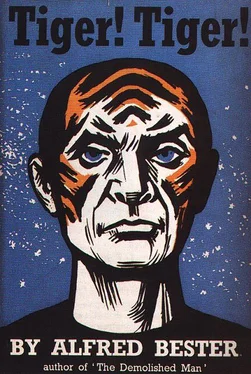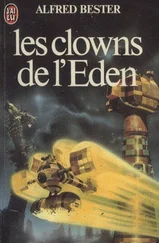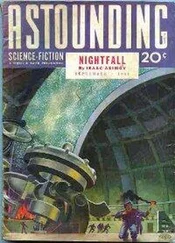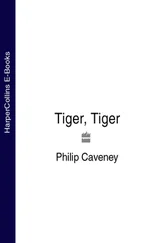Alfred Bester
THE STARS MY DESTINATION
Tiger! Tiger! burning bright
In the forests of the night,
What immortal hand or eye
Could frame thy fearful symmetry?
–Blake
THIS WAS A GOLDEN AGE, a time of high adventure, rich living, and hard dying . . . but nobody thought so. This was a future of fortune and theft, pillage and rapine, culture and vice . . . but nobody admitted it. This was an age of extremes, a fascinating century of freaks . . . but nobody loved it.
All the habitable worlds of the solar system were occupied. Three planets and eight satellites and eleven million million people swarmed in one of the most exciting ages ever known, yet minds still yearned for other times, as always. The solar system seethed with activity . . . fighting, feeding, and breeding, learning the new technologies that spewed forth almost before the old had been mastered, girding itself for the first exploration of the far stars in deep space; but, «Where are the new frontiers?» the Romantics cried, unaware that the frontier of the mind had opened in a laboratory on Callisto at the turn of the twenty-fourth century. A researcher named Jaunte set fire to his bench and himself (accidentally) and let out a yell for help with particular reference to a fire extinguisher. Who so surprised as Jaunte and his colleagues when he found himself standing alongside said extinguisher, seventy feet removed from his lab bench.
They put Jaunte out and went into the whys and wherefores of his instantaneous seventy-foot journey. Teleportation . . . the transportation of oneself through space by an effort of the mind alone. . . had long been a theoretic concept, and there were a few hundred badly documented proofs that it had happened in the past. This was the first time that it had ever taken place before professional observers.
They investigated the Jaunte Effect savagely. This was something too earth-shaking to handle with kid gloves, and Jaunte was anxious to make his name immortal. He made his will and said farewell to his friends. Jaunte knew he was going to die because his fellow researchers were determined to kill him, if necessary. There was no doubt about that.
Twelve psychologists, parapsychologists and neurometrists of varying specialization were called in as observers. The experimenters sealed Jaunte into an unbreakable crystal tank. They opened a water valve, feeding water into the tank, and let Jaunte watch them smash the valve handle. It was impossible to open the tank; it was impossible to stop the flow of water.
The theory was that if it had required the threat of death to goad Jaunte into teleporting himself in the first place, they'd damned well threaten him with death again. The tank filled quickly. The observers collected data with the tense precision of an eclipse camera crew. Jaunte began to drown. Then he was outside the tank, dripping and coughing explosively. He'd teleported again.
The experts examined and questioned him. They studied graphs and X-rays, neural patterns and body chemistry. They began to get an inkling of how Jaunte had teleported. On the technical grapevine (this had to be kept secret) they sent out a call for suicide volunteers. They were still in the primitive stage of teleportation; death was the only spur they knew.
They briefed the volunteers thoroughly. Jaunte lectured on what he had done and how he thought he had done it. Then they proceeded to murder the volunteers. They drowned them, hanged them, burned them; they invented new forms of slow and controlled death. There was never any doubt in any of the subjects that death was the object.
Eighty per cent of the volunteers died, and the agonies and remorse of their murderers would make a fascinating and horrible study, but that has no place in this history except to highlight the monstrosity of the times. Eighty per cent of the volunteers died, but 20 per cent jaunted. (The name became a word almost immediately.)
«Bring back the romantic age,» the Romantics pleaded, «when men could risk their lives in high adventure.»
The body of knowledge grew rapidly. By the first decade of the twenty-fourth century the principles of jaunting were established and the first school was opened by Charles Fort Jaunte himself, then fifty-seven, immortalized, and ashamed to admit that he had never dared Jaunte again. But the primitive days were past; it was no longer necessary to threaten a man with death to make him teleport. They had learned how to teach man to recognize, discipline, and exploit yet another resource of his limitless mind.
How, exactly, did man teleport? One of the most unsatisfactory explanations was provided by Spencer Thompson, publicity representative of the Jaunte Schools, in a press interview.
THOMPSON:Jaunting is like seeing; it is a natural aptitude of almost every human organism, but it can only be developed by training and experience.
REPORTER:You mean we couldn't see without practice?
THOMPSON:Obviously you're either unmarried or have no children preferably both.
(Laughter)
REPORTER:I don't understand.
THOMPSON:Anyone who's observed an infant learning to use its eyes, would.
REPORTER:But what is teleportation?
THOMPSON:The transportation of oneself from one locality to another by an effort of the mind alone.
REPORTER:You mean we can think ourselves from . . say . . . New York to Chicago?
THOMPSON:Precisely; provided one thing is clearly understood. In jaunting from New York to Chicago it is necessary for the person teleporting himself to know exactly where he is when he starts and where he's going.
REPORTER:How's that?
THOMPSON:If you were in a dark room and unaware of where you were, it would be impossible to jaunte anywhere with safety. And if you knew where you were but intended to jaunte to a place you had never seen, you would never arrive alive. One cannot jaunte from an unknown departure point to an unknown destination. Both must be known, memorized and visualized.
REPORTER:But if we know where we are and where we're going. . .
THOMPSON:We can be pretty sure we'll jaunte and arrive.
REPORTER:Would we arrive naked?
THOMPSON:If you started naked. (Laughter)
REPORTER:I mean, would our clothes teleport with us?
THOMPSON:When people teleport, they also teleport the clothes they wear and whatever they are strong enough to carry. I hate to disappoint you, but even ladies' clothes would arrive with them.(Laughter)
REPORTER:But how do we do it?
THOMPSON:How do we think?
REPORTER:With our minds.
THOMPSON:And how does the mind think? What is the thinking process? Exactly how do we remember, imagine, deduce, create? Exactly how do the brain cells operate?
REPORTER:I don't know. Nobody knows.
THOMPSON:And nobody knows exactly how we teleport either, but we know we can do it-just as we know that we can think. Have you ever heard of Descartes? He said: Cogito ergo sum. I think, therefore I am. We say: Cogito argo jaunteo. I think, therefore I jaunte.
If it is thought that Thompson's explanation is exasperating, inspect this report of Sir John Kelvin to the Royal Society on the mechanism of jaunting:
We have established that the teleportative ability is associated with the Nissl bodies, or Tigroid Substance in nerve cells. The Tigroid Substance is easiest demonstrated by Nissl's method using 3.7~ g. of methylen blue and i .'~ g. of Venetian soap dissolved in 1,000 CC. of water.
Where the Tigroid Substance does not appear, jaunting is impossible. Teleportation is a Tigroid Function.
(Applause)
Any man was capable of jaunting provided he developed two faculties, visualization and concentration. He had to visualize, completely and precisely, the spot to which he desired to teleport himself; and he had to concentrate the latent energy of his mind into a single thrust to get him there. Above all, he had to have faith . . . the faith that Charles Fort Jaunte never recovered. He had to believe he would jaunte. The slightest doubt would block the mind-thrust necessary for teleportation.
Читать дальше











